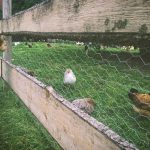Chickens are naturally curious and active animals with a strong instinct to scratch and peck at the ground. This behavior serves multiple purposes, including foraging for food and maintaining the health of their beaks and claws. Their exploratory nature and foraging instincts can lead to attempts to escape from enclosures.
Understanding these innate behaviors is essential for effectively containing chickens within a fenced area. As social creatures, chickens require adequate space and environmental enrichment to prevent stress and undesirable behaviors such as feather pecking and aggression. Providing a stimulating environment with ample space, diverse objects to explore, and engaging activities can reduce the likelihood of escape attempts.
Creating a secure and enriching habitat that addresses the social and behavioral needs of chickens is crucial for maintaining a healthy and content flock.
Table of Contents
- 1 Securing the Base of the Fence
- 2 Using Barriers to Deter Digging
- 3 Creating a Digging Area for Chickens
- 4 Providing Adequate Enrichment and Distractions
- 5 Regularly Inspecting and Maintaining the Fence
- 6 Seeking Professional Help if Necessary
- 7 FAQs
- 7.1 What are some methods to keep chickens from digging under a fence?
- 7.2 Why do chickens dig under fences?
- 7.3 How deep should the barrier be buried to prevent chickens from digging under the fence?
- 7.4 Are there any natural deterrents to keep chickens from digging under a fence?
- 7.5 What are the potential risks of chickens digging under a fence?
Key Takeaways
- Chickens have natural behaviors such as scratching, pecking, and dust bathing that should be understood and accommodated for in their living environment.
- Securing the base of the fence is crucial to prevent chickens from digging underneath and escaping, using materials such as hardware cloth or burying the fence underground.
- Barriers such as rocks, bricks, or paving stones can be used to deter chickens from digging along the fence line.
- Creating a designated digging area for chickens with loose soil or sand can help satisfy their natural digging instincts and prevent them from digging along the fence.
- Providing adequate enrichment and distractions such as perches, toys, and hanging treats can keep chickens mentally stimulated and less likely to focus on digging.
- Regularly inspecting and maintaining the fence, including checking for any signs of wear or damage, is important for ensuring the security of the chicken enclosure.
- Seeking professional help, such as consulting with a poultry expert or hiring a professional fence installer, may be necessary for addressing persistent digging issues or making significant improvements to the chicken enclosure.
Securing the Base of the Fence
Preventing Digging and Escape
This will make it much more difficult for chickens to dig their way out and escape. In addition to securing the base of the fence, it’s also important to regularly inspect the perimeter for any signs of wear or damage.
Regular Inspection and Maintenance
Over time, the ground may shift, or predators may try to dig under the fence, which can create weak spots that chickens may exploit. By regularly checking the base of the fence and making any necessary repairs, you can ensure that your chickens remain safely contained within their enclosure.
Keeping Your Chickens Safe
By following these steps, you can help prevent your chickens from escaping and ensure their safety and well-being.
Using Barriers to Deter Digging

In addition to securing the base of the fence, you can also use barriers to deter chickens from digging. One effective method is to place large rocks or paving slabs along the perimeter of the fence. This creates an obstacle that makes it difficult for chickens to scratch and dig at the base of the fence.
Another option is to use chicken wire or hardware cloth to create a barrier that extends outwards from the base of the fence. This can help to prevent chickens from getting close enough to the fence to start digging. Another effective deterrent is to create a physical barrier using materials such as bricks, concrete blocks, or wooden boards.
By placing these materials along the base of the fence, you can create a solid barrier that prevents chickens from being able to dig underneath. These barriers not only make it more difficult for chickens to escape, but they also help to reinforce the security of the fence.
Creating a Digging Area for Chickens
One way to prevent chickens from trying to escape by digging is to provide them with a designated digging area within their enclosure. By creating a space where they are encouraged to scratch and dig, you can help satisfy their natural instincts while also reducing the likelihood that they will try to escape. You can achieve this by designating a specific area of the enclosure where you loosen the soil and add sand or dirt for them to scratch around in.
You can also scatter treats or insects in this area to encourage them to spend time digging and foraging. Another option is to provide a digging box filled with sand or dirt where chickens can scratch and dig to their heart’s content. This not only provides them with an outlet for their natural behavior but also helps to keep them entertained and occupied.
By providing a designated digging area, you can help prevent chickens from trying to escape while also promoting their physical and mental well-being.
Providing Adequate Enrichment and Distractions
In addition to creating a digging area, it’s important to provide chickens with plenty of enrichment and distractions within their enclosure. This can help reduce boredom and stress, which in turn can help prevent them from trying to escape. You can achieve this by providing items such as perches, branches, and logs for them to explore and roost on.
You can also hang treats or toys from the ceiling of the enclosure to encourage them to jump and reach for them. Another effective way to provide enrichment is by scattering food or treats around the enclosure for chickens to find. This encourages them to forage and explore, which can help keep them occupied and prevent them from trying to escape.
Additionally, providing items such as hanging mirrors or shiny objects can help keep chickens entertained and engaged, reducing the likelihood that they will try to escape.
Regularly Inspecting and Maintaining the Fence

Identifying Potential Issues
Regular inspections are essential to identify potential issues with the fence before they become a major problem. By checking the fence regularly, you can detect signs of damage or weakness, such as loose wires, broken posts, or holes dug by predators.
Maintenance and Repairs
In addition to regular inspections, it’s important to maintain the fence by making any necessary repairs or improvements. This may include replacing damaged sections of fencing, reinforcing weak spots, or adding additional barriers to deter digging.
Ensuring a Secure Enclosure
By staying on top of maintenance, you can ensure that your fence remains secure and effective at keeping your chickens safely contained. A well-maintained fence provides peace of mind, knowing that your chickens are protected from predators and prevented from escaping.
Seeking Professional Help if Necessary
If despite your best efforts, you find that your chickens are still managing to escape from their enclosure, it may be time to seek professional help. A professional animal behaviorist or chicken expert can provide valuable insight into why your chickens are trying to escape and offer solutions for preventing it from happening in the future. They may be able to identify underlying issues such as overcrowding, lack of enrichment, or social stress that are contributing to their behavior.
In some cases, it may be necessary to make significant changes to the enclosure or management practices in order to effectively prevent chickens from escaping. A professional can provide guidance on how best to address these issues and create a secure and enriching environment for your flock. By seeking professional help if necessary, you can ensure that your chickens remain safely contained within their enclosure while also promoting their overall well-being.
If you’re looking for tips on how to keep chickens from digging under the fence, you might also be interested in learning about the best chicken coop for your flock. Check out this article on choosing the right chicken coop for your needs to ensure your chickens have a safe and secure home.
FAQs
What are some methods to keep chickens from digging under a fence?
Some methods to keep chickens from digging under a fence include burying hardware cloth or chicken wire along the perimeter of the fence, using concrete or paving stones at the base of the fence, and creating a barrier with rocks or bricks.
Why do chickens dig under fences?
Chickens may dig under fences to access new foraging areas, escape confinement, or seek out cooler ground for dust bathing.
How deep should the barrier be buried to prevent chickens from digging under the fence?
The barrier should be buried at least 12-18 inches deep to prevent chickens from digging under the fence.
Are there any natural deterrents to keep chickens from digging under a fence?
Some natural deterrents to keep chickens from digging under a fence include planting thorny bushes or shrubs along the perimeter, using citrus peels or coffee grounds as a natural repellent, and creating a barrier with large rocks or logs.
What are the potential risks of chickens digging under a fence?
The potential risks of chickens digging under a fence include escaping and getting lost or injured, accessing areas with potential hazards or predators, and causing damage to neighboring properties.
Meet Walter, the feathered-friend fanatic of Florida! Nestled in the sunshine state, Walter struts through life with his feathered companions, clucking his way to happiness. With a coop that’s fancier than a five-star hotel, he’s the Don Juan of the chicken world. When he’s not teaching his hens to do the cha-cha, you’ll find him in a heated debate with his prized rooster, Sir Clucks-a-Lot. Walter’s poultry passion is no yolk; he’s the sunny-side-up guy you never knew you needed in your flock of friends!







